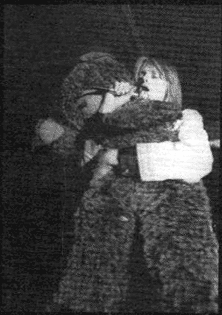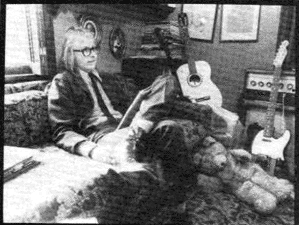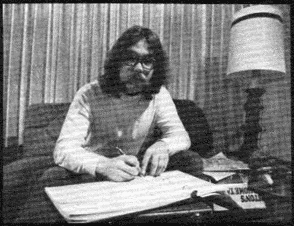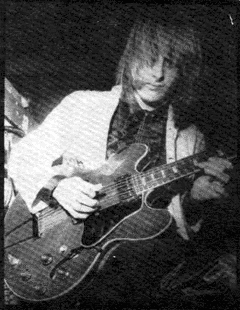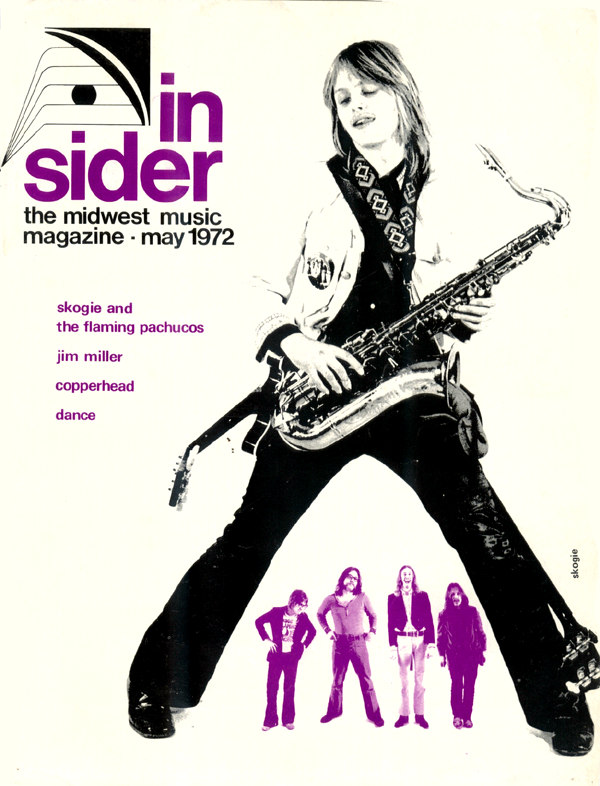
<Cover> contents 6 Skogie and the Flaming Pachucos. A Saga: from an Edina Basement to the bright lights of Cedar Avenue and back. by Tom Mutha |
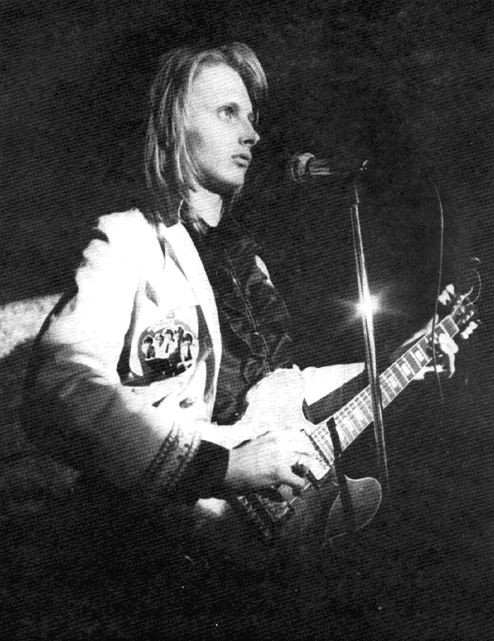
Page 6. |
| 
| ||||||
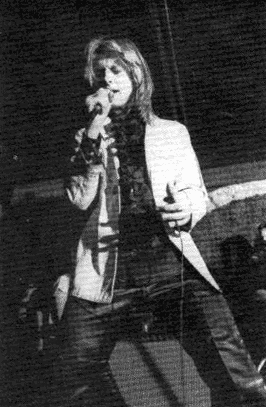 Rick 'Skogie' Moore at Home Saloon 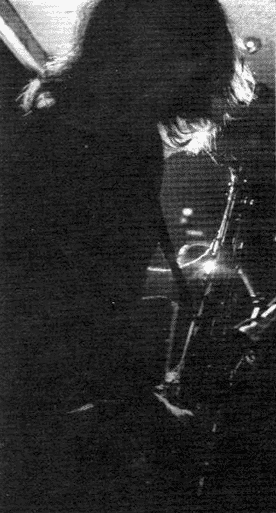 Jim Greenberg at Home Saloon |
turned scores away at the door: "Oh, I love those fellows. They're just nuts."
MINNEAPOLIS STAR critic Charles Quimby thought so, too, but not quite in the same way: he dubbed their music, much to Skogie's chagrin, "a frenetic brand of comic rock." Complicated scores and instrumental experimentation went unheard. Nevertheless, the group had been granted, as Quimby pointed out, "the stamp of legitimacy." Legitimacy comes in other ways, too. WCCO TV will present the group on "Moore on Tuesday" May 2 at 9:30. The group will soon release a local single in hopes of gaining a larger audience thru air-play. Alpha Productions, after trying the group at the Home Saloon one Sunday, agreed to exclusively represent the group. Alpha head Ralph Ortiz had finally overcome an aversion to dropping popcans at the end of songs. Home is now also a frequent site of Skogie appearances. Home's over-21 crowd is slightly less appreciative of Skogie's special brand of 3rd generation rock. Like some of the critics that grew up with the 2nd generation rockers, they take themselves a little too seriously. Girls resist an impulse to scream and end up making choking, gurgling noises while their male companions look aloofly at the ceiling. In fact, exclusively male audiences look totally askance at Skogie Moore's stylized theatrics and posturing. He remembers, "When I first got on a stage, I was pretty flamboyant, because I was used to practicing in the basement with a couple of friends. I would run all over the room, lie on the floor, and jump all over the place, because that's what I thought you were supposed to do when you played music. Then one day I looked around the room and everybody else was just standing there." The present Pachucos never just stand there. Skogie Moore duckwalks and dives over his amplifier. Denny Peterson literally leaps around the stage with totally uncalculated abandon. Jim Greenberg was standing around looking intellectual, so Moore gave him "Ram It!" Skogie: "I also want to set him up there with an acoustic guitar and have him sing some kind of folk ballad and us be his back-up band. That's my next idea for him." If Skogie and the Flaming Pachucos seem a little ridiculous, however, it's because rock and roll has always been ridiculous. If rock has its intellectual side, it also has always had a fun side, and Skogie effectively combines the two. Pachuco music is a reminder that twenty years of rock and media leaves us more than auditoriums full of speed-freak stompers trampling each other to death in the frenzy of the BOOGEH! Rock may be an art, but it is also a tradition fraught with pre-conceived theatrical as well as musical notions. When those preconceptions are too perfectly fulfilled, we laugh, perhaps a little nervously, because we're not sure who the joke is on. The joke is on us, and Skogie Moore is laughing too, but not out of ridicule. He's laughing because he is having a good time. But the Audience at Home sits on its hands and on its dancing shoes until a flash from the past like Skogie Moore's Presley selections or the Dennis Peterson and Al Galles Soul Review drags it unwittingly but kicking onto the floor. Only then does the audience realize that the show is really itself, and most of Moore's songs have a 4/4 beat too, even if they are originals. When the audience finally forget themselves, it can no longer be introspective or paranoid. But then, screamers and dancers are just as funny as the band if you're not into it. And laughing "at" is better than not laughing at all. Skogie, however, refuses to intellectualize. Quite simply, he states, "We don't do satire. We just like to play good tunes and have fun when we play them." At Home, if the music doesn't loosen them up, the beer does, and the audience is ultimately good timey. By the end of the second set, half of the audience and the entire dance floor is in an uproar, the rest of the audience is puzzled or sneering - over anxious to join the post-pepsi generation. The end of "Mohenjodaro" comes around, and instead of a bundle of coke cans, Rick Skogie Moore drops a suitcoat. The smile of recognition is not universal, but it is in the majority. At the back table, a beer bellied hustler turns to his hard won hustlee. "Let's see ya dance ta dat!" "IiiiIII QUIT, godDAMIT!" Jim Greenberg booted a refrigerator-size speaker bottom off the Skogie and the Flaming Pachucos U-haul. Denny Peterson |
| Page 8. | |
|
and Al Galles snatched it and stared transfixed while Greenberg jumped up and
down inside the trailer. He was the victim of the same momentary hysteria that strikes every aspiring rock and roll star when he realizes it is 3:30 AM, he doesn't have a Teamsters Union card, and he has at least one hour of heavy moving ahead before he can drive 25 miles between the suburban rehearsal hall and his inner-city residence. The U-haul trailer: ironic symbol of the third generation rocker whose parents had the bread to buy him an instrument and possibly lessons when he was younger, and now, much to their chagrin, is trying to make his living playing music. ("Music is a hobby, not a vocation." "Yah, that's what they told Beethoven.") When he runs out of money, he moves home, not into the streets. His band rehearses in the family basement and for road gigs, Dada lends him the Olds. And then there's that fucking trailer...have to get it unloaded and back to the gas station before morning, otherwise it's 12 dollars instead of six. Six months ago, Skogie and the Flaming Pachucos erupted out of three years in the Goldsteins' Edina basement. The Pachucos find it difficult to adjust to screaming teenyboppers, intellectual male listeners, crotch-grabbing groupies and moving three tons of equipment all in the same night. That's why Jim Greenberg turns in hysterical resignation twice a week: pure despair. Why do it? 17-year-old keyboardist Mark Goldstein: "Anything to be a star." Idealistic and materialistic ambition is certainly one quality this unlikely aggregation possesses on below freezing nights. Their driving force hasn't arrived, however, and probably won't this evening. He hides his genius under a straw blonde 1965 beatle cut. and himself at equipment moving time: Skogie. Rick Moore, that is, offstage. The man who is part Paul McCartney and Frank Zappa: an anglophile bubblegummer avante-gardist, jazzy and commercial, analytical observer of popular art, and above all the focus of the dreams, devotion and utter faith of the most diverse collection of musicians. The four Flaming Pachucos are probably the last pieces of a lifetime puzzle whose player has always known exactly what he wanted, but has never known exactly where to look for it. The pieces: Jim Greenberg, victim/veteran of half a score of declining second generation local commercial bands; drummer All Galles and bassist Denny Peterson, token street people for the benefit of the over-hip; and keyboardist Mark "Little Brother" Goldstein, who still arrives at rehearsal every night in an orange Edina High Shcool bus. Peterson: "I have an ambition to present this band. I believe in this music, and I believe in Skogie." The ground swell cult of tongue-in-cheek hipsters growing up around the Pachucos believes, too. The Pachucos are seasoned eccentrics. Goldstein, 17, the youngest member of the group, has probably been in show business longer than anyone else; but not as a musician. At age 6, Little Brother was a bridge-playing prodigy, making the rounds of tournaments as his dad's partner. His showing in the national tournament at 7 made him friends like Congressman Clark MacGregor and General Gunther. They wanted their pictures taken with him. Publicity also made his primary school classmates undying enemies. "They made me seem like an egghead. Everything I did had to be cute. I wasn't an egghead at all. I was just like the other kids." To prove it, Goldstein resigned professional bridge in disillusionment at 8, and became state junior league ping-pong champ instead. Somehow during all of this cosmopolitan activity, Mrs. Goldstein persuaded her son to take piano. "At lessons I used to throw my books at the piano and stuff..." Goldstein started listening to WLS radio in Chicago under his pillow at night, and in the sixth grade, saw the Yardbirds at Dayton's Department Store sock-hop. Then one day he was out skate-boarding and saw one of his friends with his new ELECTRIC guitar. "I saw him, and it looked so cool on him and everything. I had to have an electric guitar. That night as I lay in bed I realized I just had to have one." With $15 and $10 parental subsidy, he bought his guitar and began playing 15 minute versions of "Foxy Lady" with 13 minutes of feedback. By the time Goldstein was in the eighth grade, he was a serious musician, back on keyboards and leading his own band, Euphoria. The group set up in the Tracy Ave |  'Big' Jim Greenberg |
| Page 9. | |
|
basement in the Euphorium, the room that still headquarters the Flaming Pachucos.
Meanwhile at Southwest High School, Denny and Al started their first 5-piece group, Mozart's Mafia. The two had gotten guitars in grade school, and convened their first band when one guy said he played piano. Denny: "The popular song he could play was "Green, Green" by the Christy Minstrels, so we thought we'd better hang it up for a while and learn to play before we played. We didn't know anything. We just thought you had to bang on it and music would come out. We never knew you had to practice." They returned home to woodshed. "Al would call me on the phone, and I got really envious because clean chords were coming out and I was still struggling with C, F and G7." When Denny and Al got together after summer, Denny discovered Al had been playing his guitar in an open tuning with a pencil. "I almost killed him when I found out..." Chastened Galles switched to drums. The Mafia was a step upward from playing in garages thru a wollensak tape recorder to the beat of a single snare drum. The original Mafia was an English Invasion group that faked accents on stage - a trick picked up from some of the "big time" local groups of the mid-sixties. Al met Jim Greenberg in the gym class when the Mafia was thinking of adding a horn section for a school assembly. Mid-sixties Greenberg was a rising young member of the highschool elite, member of the newspaper staff, debate team, and student government. After the appropriate amount of soul searching and overcoming parental opposition to his association with such unsavory characters as Denny and Al ("They were the black sheep of our school") Jim Joined. The Mafia's version of "Harlem Shuffle" and "I Feel Good" went over with the student body, so the group became an 8-piece choreographed white punk-soul band playing the standard local bag of "Show Me" and "Midnight Hour." Jim decided to go professional, got into the union, joined a flock of now-legendary local show bands, He always seemed to get in just about the time the bands were going thru final debilitating stages of personnel problems. Following that pattern, he went thru Sounds of Soul, Loviah Smith and the Soul sensations, Blues Cube, the Sir Raleighs and the unnamed off-shoot of the Sir Raleighs that didn't become Copperhead. After a year off from music and trying journalism at the University of Minnesota, Greenberg returned to commercial rock for spending money, gigging with Oedipus Rex and the Syndicate. Meanwhile Denny and Al played country rock and surrogate Buffalo Springfield with the basement band, Homestead. Skogie Moore is band-leader and exclusive composer of 95% of the Flaming Pachucos' music and had never met any of his present players until three years ago. He was 21 when he put the present version of the band together, and will be 22 in July. (The rest of the Pachucos, exclusive of Mark Goldstein, are 21.) Skogie grew up in Richfield, Minnesota where he picked up a few guitar chords and an obsession with the newly popular Beatles before moving to California in June, 1964. He grew a Beatle cut and got into hassles with surfing, hot rodding school associates. "I didn't have any friends and really didn't want any. I just sat in my room and played Beatle songs and wrote my own." Skogie poured through rock fanzines, absorbed and dissected every Beatle album that came out, and listened exclusively to the Fab Four, Peter and Gordon, and the Kinks. By October 1964 he had unequivocally decided his vocation was playing rock and roll music and he started writing. "I always noticed that the Beatles wrote their own songs, so I figured that to be a rock and roll star I'd better write my own songs." "Right after 'A Hard Days Night' came out, my cousin and I spent two weeks making cardboard replicas of the Paul McCartney bass, the John Lennon rhythm guitar, George Harrison's lead guitar, and Ringo's drums. We used to lip-synch to records. I wanted to play real music, and they wanted to lip-synch, but I finally got them going. We learned 'You Really Got Me' by the Kinks and 'And I Love Her' by the Beatles." Skogie pursued his musical ambitions with the same vigor most 13 year-olds |
| |||||||
| Page 10. | ||||||||
|
do for major league baseball aspirations. He started putting together bands and
teaching reluctant copycat cohorts to play his songs. His narrow interests and extreme diffidence made finding other players difficult. "When I was in the tenth grade, a new guy moved into our neighborhood. I had heard he played guitar, so one day when he was walking down the street I put my amplifier up against the window and played my guitar at him to attract his attention." The two got Skogie's first serious group together, but in January 1966, Rick returned to Richfield with his parents. Moore continued his apprenticeship with the media in Minnesota, keeping to himself, teaching friends to play, writing prolifically, and growing up with the music, always one step ahead of the trends. He and friends spent summer afternoons writing more songs and arranging them for ensembles of fluctuating size. The groups would meet early in the day, rehearse the previous day's song, discard it or tape it, and then begin work on another song. Skogie did the same with other people's music, playing thru works like the Beatles' white album at a rate of two or three songs per day. "During the Summer of Love, we sat in the basement and turned out all the lights and jammed out San Francisco music. We alternated rhythm and lead for a million hours." By the end of the summer, Moore was a creditable lead guitarist. Skogie's listening interests broadened, and he continued to singlemindedly pursue guitar virtuosity and related skills like arranging and reading music. When he graduated from Richfield High School in 1968, the outside world intruded in the form of the draft. To escape, he enrolled at the University of Minnesota in Music Theory and Composition. For Skogie, who had spent most of his youth hunched over a guitar and tape recorder in his bedroom, college was a watershed experience. "I found an organ in Scott Hall, and I was playing around with that one afternoon and somebody came in. I thought I must be using his organ time or something, but he said it was alright, and that he'd show me how to use it, which he did." The organist said he was forming a group which never materialized, but before his association with Moore ended, he had interested him in Thelonius Monk and other jazzmen, besides starting him on keyboards. "I'd go to school and play piano all day, and I started missing classes." "I used to listen to the Mothers before I got out of high school. I had some of their records, but I was never particularly thrilled by them. Then when I got into U music, my theory instructor would illustrate his points by pounding something on the piano. It always came out sounding like the Mothers. Whatever he'd play it always sounded like the Mothers. I thought it was pretty cool, so I started listening to the Mothers more." Frank Zappa joined the Beatles as an audible influence on Moore's writing. "When I became non-draftable, there was no longer any reason to stay in school. I already had most things figured out before we got to them in class anyway, but the classes were pushing me. I'd figure things out the way I thought they should be, and then when I went to class, it would reassure me that what I thought was true." Moore's Richfield reputation grew on a small scale. The local cover band paid a visit to the reclusive songwriter and asked him to join. Moore refused politely, but said they could join HIS group. The group became An English Sky, after one of Moore's songs. Pachuco soundman Mark Winger was among the members, and he and Skogie collaborated on arrangements. "I would make up a guitar part and teach it to Winger, and then he would teach the part he wrote to the other guitarist and I'd make up another part." Skogie taught the rest of the parts to the group members. Tell me no stories of how it used to be. I've got problems of my own. "Father Hennepin." By Fall, 1969, Rick Skogie Moore had written out the chords, melody and lyrics for over 90 songs; forgotten or lost perhaps 90 more; begun his second year of college, learned to arrange, score, play guitar and piano; still wanted to be a rock star, and had rarely played in front of an audience. He was 19. Minnesota State Fair time came, bringing the Twin Cities' answer to | ||||
| Page 11. | |||||
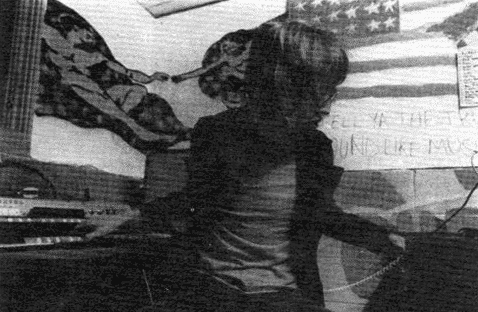 | ||
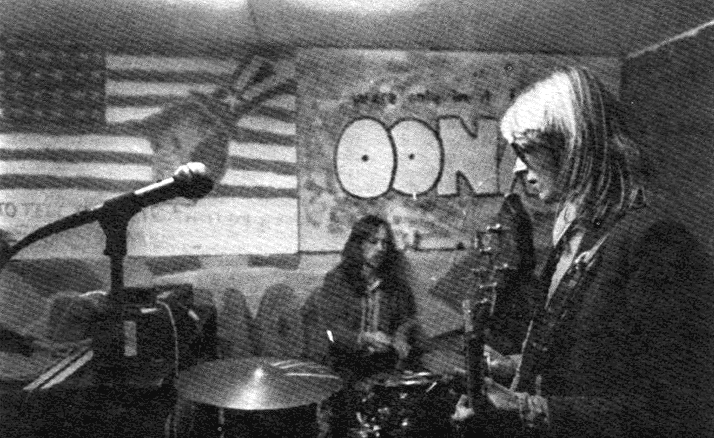 | ||
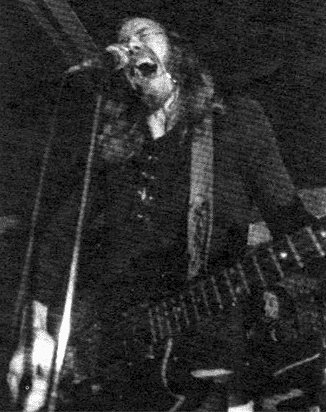 |
Mark Goldstein (Euphorium) Al Galles and Rick Moore (Euphorium) Denny Peterson (Home Saloon) | |
| Page 12. | ||
|
Woodstock" - The Young America Teen
Pavilion - vendors hawking hip new threads and the latest in leather to throngs of new boppers with hair just beginning to creep down their necks and an eye for candles, posters, incense and maybe even a hash pipe or roach clip. Powers' models were popping out of boxes to cavort in front of local bands doing their OWN versions of the latest Top 40 or some courageous UNDER- GROUND freakout music off an ob- scure Buffalo Springfield album - all in the height of fashion. Basement bands were there too, mentally changing places with the lucky stars of the midtown Blood, Sweat and Chicago reviews. (Why doesn't that hippie band play something we know?") Skogie was there in his teddy-boy outfit, black jeans, pointed shoes and his original used gym shirt, the one that got him his nickname because it came with the nonsensical word SKOGIE sewn on it. Mark Goldstein was also there, picking his way through the crowd with his fellow Euphorites, mentally wishing he had the nerve to step up on the stage at the B-Sharp Music Booth and play the house brands like those dumb-looking guys with the Bermudas and tennis shoes. And that guy with the greasy black jeans on...Skogie? Gimme a break. Euphoria stopped to watch, hoping for a good laugh. The laugh was not forthcoming. After the blonde haired kid figured out how to turn off the wah-wah pedal, the group started sounding like the Beatles and the Mothers combined. Mark, fresh out of 8th grade, waited to talk with Skogie after he got down from the stage. An English Sky split. ("Who is this creep with cotton candy on his face?") So did the other members of Euphoria. (Black pants?!!!!?") Skogie and Mark exchanged phone numbers. Two months later Skogie got a phone call. "Hi. This is Mark Goldstein." "Who?" "Mark Goldstein. You know, from the fair." "Who?" Identities established, Mark invited An English Sky to perform at the rock festival his junior high was having on the school loading dock. Skogie proposed the matter to Sky, and they turned him down flat. He went over to Mark's house one night and taught some of his tunes to Euphoria, and did the gig solo - his first official performance as Skogie. Then followed several weeks of re- hearsals with An English Sky with Skogie, Euphoria, and Skogie with |
Euphoria. Finally the 2 groups formed
one 10-man unit. Rick wrote a letter and fired everyone but himself and Mark, hired 2 people back, and formed Skogie and the Flaming Pachucos phase I. ß The new group was Hans Gasterland, drums, Dick Rogers, reeds and anything else that happened to be onstage, Mark Winger, guitars and bass, Goldstein, key- boards and Rick Moore, guitar. Limited vocal versatility and Skogie's new inter- est in Frank Zappa forced the group into a heavy instrumental bag. Skogie wrote and scored lengthy compositions, devised arrangements and taught them verbatim to the band. He also taught Rogers to play saxophone. Minneapolis' West Bank area blossomed with Skogie and the Flaming Pachucos graffiti, and black dry-makers became standard equipment for Pachuco fans, who festooned every lavatory wall in South- east Minneapolis. Skogie T-shirts and stickers became omni-present. The band auditioned a melange of Beatles songs, Frank Zappa songs and original material at the Coffeehouse Extemporť and became the house band for two or three months. Besides the Extemp, gigs were hard to come by. Sixth grade classes, Edina churches, benefits galore, and even the Extra-Ordinare jazz club sponsored impecunious gigs for the band. One of the more memorable was on Hennepin Avenue. Skogie recalls, "We had this manager for about two months named Jim Tiseth, and the only gigs he could get us were at this gay club at 916 Hennepin, and it was called The Club. So we played there for all these drag queens and stuff. It's behind this black door that says 916,and it doesn't say anything else on it." Reedman Dick Rogers was the only Pachuco Skogie trusted to write his own parts. "We really had to pamper him,"
|
says Skogie. "He was our 'Mr. Versa-
tility.'" "Pampering" took the form of a Pachuco horn band. "Dick really loved Chicago. In fact he WAS Chicago." The horn band couldn't stay in tune, so Goldstein drew the lot of firing them. When the group hired Gregg Kubera to play bass, Rogers left because he wanted to play bass. Jim Greenberg became the new reedman by answering an ad in the old CONNIE'S INSIDER. Late, summer 1971, while Greenberg was on vacation, Mark Goldstein wandered into the Cof- feehouse Extempore and heard Home- stead, Brian Peterson's CSN & Spring- field-derived group playing (of all things) Frank Zappa's "Mudshark." Mark invited bassist Denny Peterson and drummer Al Galles home for a midnight jam. he and Skogie hired them on the spot. Mr. Collins runs a trailer park Down Bloomington way. He Don't allow no rock and rollin'. He wouldn't let us play. "Collins Park Rock" ß The INSIDER phone rung in my bedroom. It was Ron Fromtheextemp. "Hello?" "Hi. I've got a bone to pick with you. fella." said Ron. "About mentioning you in the maga- zine? Really, Ron. I didn't realize you didn't use a last name. Why did you tell me you had one?" "No, it wasn't that, it was the implication, 'Overpowered extemp sound man Ron-----'." I flashed back to what had happened a month or so earlier at the new Pachucos first and last gig at the Coffeehouse Extempore. Skogie had been wearing his rock and roll star trousers with zippers down the front of the legs instead of creases. His version of "Heartbreak Hotel: ended with the flares flapping in the breeze instead of around his ankles. Greatly offended, Mark Goldstein's mother commandeered the soundroom at the back of the auditorium and castigated the group over the house PA system from her hidden vantage point. Soundman Ron had to stand helplessly by as Skogie climaxed the conflagration by addressing the voice-in-the-ceiling, "Your son's a homosexual, you know." It was a stirring debut. But back to the telephone. "Ron, I'd like to write something sizable about that group. I think they're Continued on Page 40 | |
| Page 13. | |||
|
the most original rock band in the area right
now, but no one seems to hire them. Why Doesn't the Extemp put them on anymore?" "Strictly on the QT?" "Sure." "We're having the Litter in this weekend, and they promised to put on a nice show." "What does that have to do with it?" "Why, when we had them a month ago, they were only slightly short of the Cockettes." "You mean they dropped trou, whipped it out and everything?" "Almost. But also on the qt, We'd like to put on the obscure groups that are having trouble getting heard. The ones with appeal. I mean, still on the QT, what happened to the Skogie that packed them in at the Extemp every other weekend and played Beatles songs?" "I never realized there was such a group." "There was. Every other weekend." The next call was from Mark Hughes of One Groveland. "Tom, have you seen Skogie? How do you think they'd go at my club?" "I can only speculate, but I think they'd go great. Moore writes the most appealing original material I've ever heard. The Extemp just as much as told me they wouldn't be putting them on though." "Well they are pretty strange. Like when he drops the popcans at the end of Mohenjodaro. I think that turns a lot of people off." "Why don't you put them on? I want to write a story, and I have to hear them someplace." ß Popcans? The audience at the Whole Coffeehouse looked perplexed. So did Ralph Ortiz of Alpha Productions, on hand to audition the group for his agency. "Those popcans are kind of borderline. I'd like to see the group in front of a large audience and see how they go over." The Pachucos gathered around trying not to hype too obviously and being VERY careful not to mention the word - is anyone looking - 'avant-garde'. Ortiz didn't buy the group that time around. Two Tri-Music Productions representatives who shall remain nameless just about did though. They showed up at the basement one late summer evening after the Schweigert Band contest, their Foreman and Clark suits radiat- ing all the showbiz glamour of Fuller Brush- men. The two seated themselves in the corner of the Euphorium, confided that they were the real discoverers of the Trashmen, but had let them slip through their fingers, and asked for lyric sheets. "It's important that we be able to catch the story," said one. The Pachucos whipped through a couple of medleys of Skogie's songs and instrumentals, then played a twenty minute medley of Beatle songs. The head rep got up and asked for everyone to be seated. He received rapt attention. "Now fellows, the first thing I'd like to say is that Mr. ________ and I enjoyed your music very much, although there were some parts | ||
| Page 40. | ||
|
we didn't understand. Those popcans for
instance. Do you do that onstage? We're especially interested in the classical music in some of your songs, because we've been watching the scene very closely and any expert will tell you that classical rock is the next big thing. You could try many things along those lines, just taking the high points of classical songs, just the cream, like taking the high points of Beethoven's Ninth Sym- phony and making a hit out of it without having to listen to the rest of it. Just take the best parts from these guys without all the waste. "Some of your things have a lot of possibilities for hit singles. I especially liked the one with the beep beep beep in it. Which of you wrote that?" "Paul McCartney." "Which of you is Paul?" (Confusion during which the rep finds out the Beatles wrote the song.) "Anyway, we'd like to do something for you kids. I have the ear of prominent contacts in the record industry; all it takes is a single and a phone call. Mr. ____________ and I can take care of all the A&R work, that's our specialty." Mark Goldstein raised his hand, "What does A&R stand for?" "That's arranging and recording fellows." September dragged into November to Christmas, and the new band went into daily rehearsals of a minimum of three hours to 5-to-12-to all night. By Christmas, Jim Green- berg had called every booker in Minneapolis twice with no results. But he had the problem figured out. "I think it's the popcans ............." He had also discovered that A&R means "artists and repertoire." Well, baby, it's just my kind of style. Burning things just seems to make me smile. "Atomic Number 23" Rehearsals are 7 nights a week when there are no gigs. As 7PM draws near, the circle of sofas and easy chairs in the Tracy Ave living room are one by one adorned with the near comatose bodies of Denny, Al, Jim, assorted girlfriends and hangers-on and finally Skogie himself. When the entire band has arrived, someone descends to the lower level to wake Mark, whose daily schedule begins at 7:15 PM and ends at 2 PM the following afternoon, with an occasional hour or two-long nap at 5 or 6 AM. Doc Goldstein, the band's patron, physician when necessary, the donor of rehearsal house and transportation has long since faded into some ambiguous, presumably soundproof, portion of the house. His presence or absence is seldom a matter of common knowledge. The well-trodden dis- array of the house betrays the fanatic continuum of its usage. Time does not exist at the Goldsteins' Tracy Ave home. Tonight Jim Greenberg is chewing intel- lectually on the end of his glasses, trying to flourish his pen with grandeur appropriate to the huge checkbook in which he is writing. In March the band officially became a business. Jim and Skogie had to form a partnership to get a business checking account. Every cent the band earns goes into it. Denny and Al became wards of the band for business purposes. Since Mark and Skogie live at home and Jim picks up occasional bread writing and editing for local magazines and opening B.A. Rose Music Saturday mornings, Denny and Al are the lowest common denominator. Salaries are established on the basis of their frugal living standard. Sound-man Mark Winger just sold his sixth of the band, and now gets a percentage. |
The Euphorium is a corner basement room
with 5 years of basement music caked on the walls in Day-Glo paint. The only window is splintered from having amplifiers pushed through. The Euphorium is carpeted with wires and partly lined with eggshell cartons. Mounds of crushed paper pay tribute to Moore's mania for list-making: lists of songs, lists of equipment for every eventuality, and finally, the shirk list adorn the walls. Shirk list honors go in the form of shirk-iota's to the man who dreams up the heaviest method of circumventing equipment moving. Skogie always wins; his methods entails moving a roll of masking tape back and forth across the stage indefinitely. LOOKS busy a hell. The number of people around usually varies, but since the group became serious has decreased considerably. Mark's younger sister can fill the house with ego-inflating teeny-boppers any time. One night Mark's mother dropped by and called the police to get the place declared a disorderly house. The place was duly raided, just as the Pachucos were 
|
packing off for a benefit. Mark was confined to
the house for the evening because he was still in High School. Al Galles found himself in county jail for forgotten equipment violation long since repaired. Skogie and the rest of the band went to the gig and bailed out Al during a break. Sometimes Ruby and the Dykes arrive in Leather jacketed splendor. They're an all-girl basement band the Pachucos inherited from Homestead. The Dykes first caught Skogie at the Extra-Ordinare between sets of the Litter next door at the New City Opera House. Mark Goldstein remembered. "They didn't think we could really play music. They thought we were only joking." Ruby is substantial in physical and emotional presence as well as intellect. She holds herself aloof from the instrumental lessons Denny and Al give her band, Candy and Janice. Her role is almost maternal, if you give the Pachucos latitude for oedipal tendencies. continued on page 42. |
| Page 41. | ||
|
When the Pachucos take an out-of-town gig,
Ruby and the Dykes go along and strut their leather, studs and silver shoes. "We're building them as a warm-up act," says Denny. The Dykes contribute a large portion of the veneer of eccentricity that keeps the Flaming Pachucos, especially their leader, at star-status distance from their audiences. Ruby personally supervises sewing and buying clothes for the band. Greenberg: "She really knows how to make you dress like a rock and roll star." Feel like one, too. When girls start screaming and stompers stomping, the Dykes are often at the bottom of it. Winter pre-practice follies may include playing the Pachuco sport righteous riding. The righteous rider attires himself in appropriately hip threads and rubber overshoes, and goes bumper riding, with several qualifications. He slides on the icy road alongside the moving car hanging onto the door handles and open windows and must execute demanding poses and stunts. As the car speeds along, it's occupants and participants shout such encouraging slogans as "Sole Power!" and "Right Arm!" Skogie and ex-pachuco drummer Hans Gasterland once righteous rode down Highway 100 and up the Crosstown Expressway. This epic righteous ride is celebrated in the Pachuco funky new dance-craze song, "The Ballad of Righteous Riders." Just as driver Goldstein exited onto Tracy Avenue in south Edina, Skogie wiped out and forgot three songs. Nevertheless, a new |
dance was born. Which is currently going
Nowhere. The Pachucos spend most of their rehearsal time working out complex song arrangements. Moore has pulled thirty songs from the 200 he has written out or on tape and each week a new one gets drawn out of a hat. A song is usually ready for performance after one week of arranging and an additional week of rehearsal. The present Pachucos are the first group Skogie has trusted to participate in arranging his music. Once a song is decided upon, Skogie chooses a lead singer and hand out cassettes for the private working of harmonies. Skogie, Denny and Al then jam out rhythm section parts, after which Mark, Skogie and Jim add lead lines, melody and other embellishments. The typical Pachuco arrangement is a mosaic of swirling, interweaving melody lines and extended unison and harmony duets between the various instruments in the group. By putting two or three instruments together on a line, Skogie achieves new sounds and aural textures that are both unconventional and pleasant to the ear. Denny's bass is alternately busy, melodic and driving. Al's percussion is accurate, with a few of the rough edges necessary to energetic, funky drumming. The resulting music is completely original, but for description's sake, can be compared to a collaboration between Frank Zappa and Paul McCartney. The songs seem simple enough unarranged, but the melodies leave an overpowering impression of freedom from the banalities suggested by the mere chord changes, which are unconventional in themselves. They are - well...catchy. Goldstein shares Skogie's melodic inventiveness, "Mellow Phearts," is his creation. Most of the songs are short and memorable, with simple lyrics and no poetic pretensions. Moore's love songs in particular combine simple lyrics with beautiful, memorable melody lines to achieve a kind of |
adolescent romantic sentimentality that has
"TOP 40 RADIO" written all over it. Or is it so adolescent? Perhaps just basic. Consider the first song in the "Atomic Number 23" trilogy: If you ever leave me, You would never see me cry On the outside of your smile Though the tears would fall inside my mind. Skogie says "I want my lyrics to mean anything to anyone, and nothing to anyone in particular. I sometimes find myself writing definite story lines, but I don't even like to do that." "Queen of Clubs" is an example of such a song. The piece was originally written about a bum who falls in "love" with a transvestite stripper, and was called "916" after the gay club the original Pachucos played. A newer version leaves more room for a more open-ended interpretation: dancer Candy Crystal is just a "star," the site of her act, the commonplace "Leo's Bar." The listener can take a straighter or even more convoluted view of the song as it presently exists. In any case, he shares more of the creative process. Rock as a medium has always been more important than specific interpretations of its songs or messages. No one ever tried to impute metaphysical implications to "I want to hold your hand." Nevertheless, Rick has drawn critical fire for "Vapid lyrics." Individual band members have considerably less power over Skogie's instrumentals, which he usually arranges and scores completely in advance. The group has total respect for his opinions and ability. Goldstein says, "He used to suggest a part to me, and I'd look at him and say 'we can't do that, that's crazy!' Now, after all these years, I always take his suggestion. I have more respect for his musical thing than I have for my own. Skogie's instrumentals, like his songs, are an amalgamation of everything he has ever heard, |
| Page 42. | ||
|
They range from acid rock to bop to new wave
jazz, flirting unabashedly with classical music from the fugue to twelve tone. Moore's personal repertoire of improvisational techniques ranges the full spectrum from blues to inverting themes. His lead guitar has a flowing economy akin to George Harrison's in addition to melodic sophistication, which is intrinsically his own. The band closes down rehearsal at the Goldstein's any time from 10:30 to 12 PM, and sometimes goes all night. Arranging the never-ending stream of work from as prolific a composer as Skogie can get tedious and often does when ideas are sparse. The situation is complicated by the group's obsession with doing things unconventionally or conventionally, but better than ever before. Skogie says, "I'm not searching for a new musical direction. It seems to me that for the moment everything that can be done has been done. all that remains is putting old stuff together in new ways." such songs as "Collins Park Rock," "Wolfman Strikes Again," and "Springfield Gardens" are obvious testimonials to this philosophy. The first is kind of implicit "Rock and Roll Is Here To Stay" telling the story of an old man who doesn't like the music. the band celebrates anyway with passages that pay tribute to the sixties rock subculture with a basic fifties riff slightly embellished: (She's the) queen of the limousine. princess of rock and roll. when she's down on her knees, Her aim is to please, and the band all agrees she's got soul. from a party in a house trailer court to an orgy in a limousine. The surrealistic cultural panorama presented in the song evokes a sordid nostalgia that is almost a decadent "American Pie." |
"Springfield Gardens" was a "Do You
remember? (All the guys that gave us Rock & Roll)" of country rock. Finally, "Wolfman strikes Again" is really a Fats Domino tune in disguise. The instruments are relegated to a locomotive ka-chunk, ka-chunk, while the melodic content of the song is completely orchestrated for voices. The voices substitute for instrumental accompaniment, but instead of scat singing, they recite such trivia as "Mary Ellen Rogers" (Wally Cleaver's girlfriend), and every condom brand name Al Galles could remember. The band put it together at a twelve hour all-night session. By midnight Mark Goldstein's day is just beginning. He steps out for a breakfast of coke and pizza before returning home for personal practice if the band has finished. Lately he, Skogie, and Denny and Al have been spending nights experimenting with the group's new four track recorder, in preparation for recording a local single. Greenberg returns home to for rest up for a day of writing features or poetry and taking care of band-related business hassles, Skogie often returns home to compose. Moore's day begins a few hours after the previous evening's rehearsal ends. Sleep, getting a driver's license and dope-smoking all fall into the same category for Skogie: things for which he doesn't have time. Getting out of bed in the morning, he reaches for his guitar before his toothbrush. He disdains fashion, putting on the same unconventional garb his mother dutifully washes every night for weeks on end. his suitcoat is stuffed with lists, notebooks and guitar picks, as well as a portable toothbrush he can use when he has a moment. No matter what time he gets up, at 12:00 noon sharp he hitchhikes to 17-year-old girlfriend Lucy Colvin's Theilan Ave house in Edina. The two have a study room there adjoing the family living room. The room is packed with books, amplifiers, and musical rubbish. The walls are lined with Moore and |
Colvin's record collection. Moore's acoustic and
old electric guitar and Colvin's new fender telecaster rest on the amplifiers, and the piano is mounded with notebooks and lists, indulging his taste for esoteric anglophilia. (He recently bought a map of London to serve as a reading aid.) He may also work on one or more of the 13 songs he is presently writing. He usually doesnít write anything down until itís completed, so as many are lost as finished. afternoons are also the time he uses to pursue his personal research projects. He is presently figuring out how to make maximum use of the groupís new four track by analyzing the ultimate four track stereo album, "Sgt. pepperís Lonely Hearts Club Band" by the Beatles. His analysis take the form of a measure-by-measure chart containing all the details of arrangement, instrumentation and orchestration, and exactly what is on each track, including notes and lyrics, all taken down by ear. "Itís sort of strange how they recorded it. they recorded the four Beatles on the first track, and voices, or voices and instruments mixed together on the last two tracks. The way they mixed it is what makes it. On the first song, the original four instruments are on the first two tracks. On the one track they are filtered with treble, and on the other with bass. On one track there's the lead vocal and lead guitar, and on the other more instruments. Then, in the middle of the song, these horns come in and the voices switch over to the other track. Then you just hear echo of the horns in one track and the instruments stay in the middle. At the end it switches back again. It gives a real stereo effect, but itís really not a stereo recording, just a mono one divided up. "I like the recordings from around 1967 the best. We talked about that, and we want to |
| Page 43. | ||
|
get a good sound on tape, and we think
a four-track is probably the best way to do it. Newer things sound cleaner, but thereís something missing." The Colvin's study also houses the couples tape collection, including several years of Christmas compositions for Colvin and reels of nearly every musical group Moore has ever put together. Some of the Pachucos' present repertoire is in its fourth or fifth arrangement. Some songs such as "Magic Lock" go back to early 1967. "Colonel Arnoldís Cross," "Collins Park Rock," and "Wolfman" date to 1968. Skogie recalls how he wrote the latter: "I wrote that the night Morrill Hall at the U was seized. I saw something happening at Morrill, and I got up on this thing to see, and I slipped and fell about ten feet down into this pit. I thought of the first line just as these guys were pulling me out, and I wrote the rest of the song as I was walking down the mall. When I got home it was pretty hard to figure out the chords because all I had were these words and melody in the back of my mind." Skogie writes whenever an idea hits him. Heís written songs riding his bicycle to the store ("Blueberries For Baby"), lying on a pool table at MacPhail Center waiting for Colvin to finish her piano lesson ("Tonightís The Night"), and when inspiration reaches out from a record he hears. Everything in his narrow, reclusive world, and everything the media throws at him receives his musical scrutiny: "I like to get onto something and thoroughly check it out. I might read about somebody Iíve never heard of. So Iíll go |
out and get their record, and then Iíll read a
bout their influences, so Iíll go out and get their influences." "Every week I have a new favorite to listen to...Ray Charles, the Beach Boys. Whomever Iím listening to, thatís my influence for the week. Lucy and I have helped each other expand musically to the point where we have no taste. We like everything." Future arrangements may come from even earlier periods in Skogie's musical history: "We could be doing different songs. These just happen to be the ones weíre doing. All of them would come out just as well if we worked on them just as hard as the ones we've got. Perhaps not all - but certainly as many as we'd ever want. We really canít have any use for 200 songs." Colvin prepares supper for Moore every evening, and he eats with the Colvin family if they are home. At 7 PM Denny and Al pick him up and drive to the Euphorium for another rehearsal. THE END. | |
| Page 44. | ||
